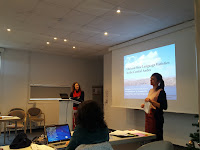On December 16th, Postcolonial Language Studies organized a linguistic colloquium with focus on new varieties in the Americas. These are varieties born out of the contact situations of colonial, indigenous, and African languages, such as for example the Afro-Hispanic varieties spoken in Bolivia, Peru, and Ecuador. In the colloquium, we had presentations by local and international scholars about degrees of contact and restructuring in these cases. Many thanks to all the participants!
Programm:
Linguistisches Kolloquium: New Varieties in the Americas
Freitag, 16. Dezember 2016
Gästehaus der Universität Bremen
Auf dem Teerhof 58
Kontakt: Danae Perez Email: danae.perez@es.uzh.ch, Eeva Sippola Email: sippola@uni-bremen.de
Programm:
Linguistisches Kolloquium: New Varieties in the Americas
Freitag, 16. Dezember 2016
Gästehaus der Universität Bremen
Auf dem Teerhof 58
Kontakt: Danae Perez Email: danae.perez@es.uzh.ch, Eeva Sippola Email: sippola@uni-bremen.de
09:00 - 09: 15 Eeva Sippola (Universität Bremen)
Begrüßung und Einführung
Begrüßung und Einführung
09:15 - 10:00 Maria Mazzoli (Universität Bremen)
Michif - a mixed language as a new variety
10:00 - 10:45 Sandro Sessarego (University of Texas at Austin und Universität Freiburg FRIAS)
A new look at the Spanish creole debate: The Legal Hypothesis of Creole Genesis
10:45 - 11:00 Kaffeepause
11:00 - 11:45 Laura Álvarez (Stockholms Universitet)
Cupópia: the Afro-Brazilian speech of Cafundó
11:45 - 12:30 Ana Paulla Braga Mattos (Aarhus Universitet)
The speech variety of Kalunga: an Afro-Brazilian community in Goiás
12:30 - 14:00 Mittagspause
14:00 - 14:45 Albert Wall (Universität Zürich)
What's new about Differential Object Marking in new varieties of Spanish and Portuguese?
14:45 - 15:30 Danae Perez (Universität Bremen und Universität Zürich)
Old and new language varieties in the Central Andes
15:30 - 15:45 Kaffeepause
15:45 - 16:30 Maja Robbers (Universität Bremen)
Contact-induced change in young people's Totonac
16:30 - 17:15 Ana Kondic (MPI SHH Jena)
Spanish influences on Huastec
Sandro Sessarego, Laura Álvarez
Albert Wall, Danae Perez
photo on the right: (from left to right) Eeva Sippola, Albert Wall, Ana Paulla Braga Mattos, Maja Robbers, Sandro Sessarego, Maria Mazzoli, Danae Perez, Laura Álvarez























